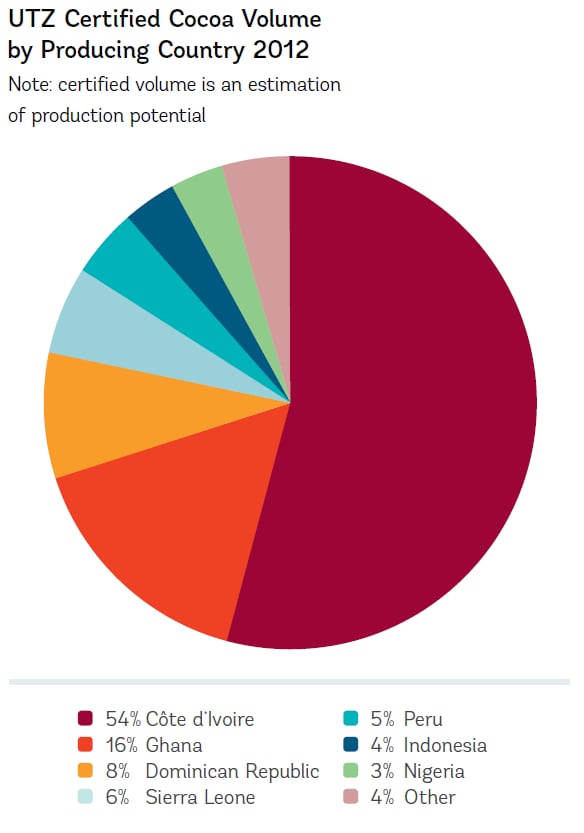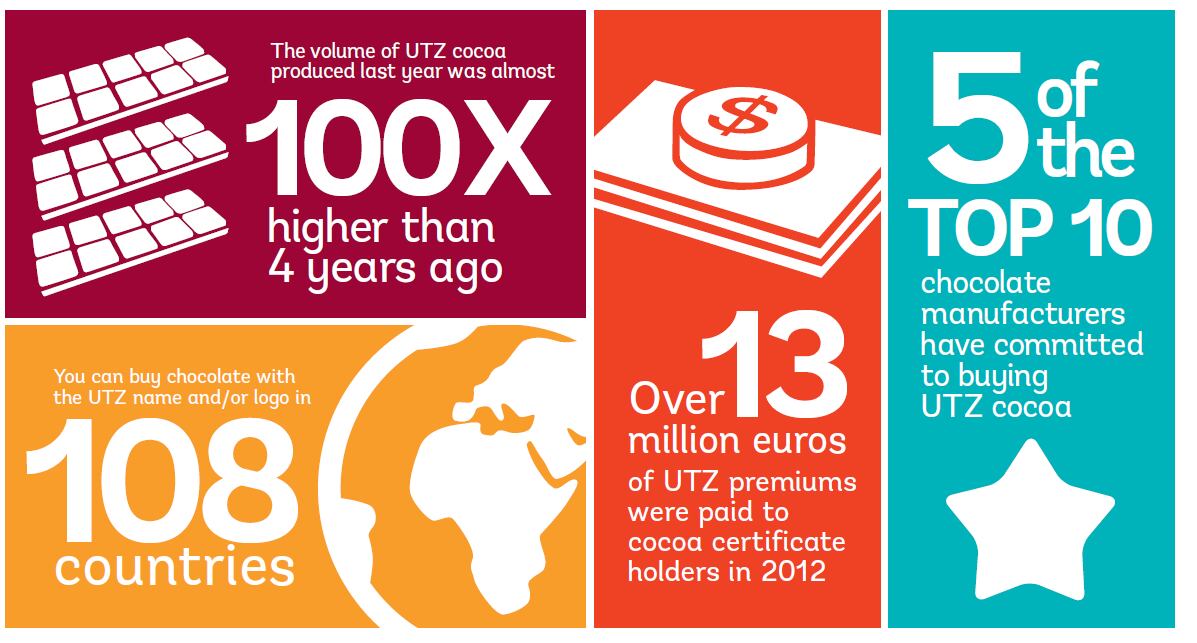UTZ Certified today released its Impact Report, combining results from 24 external studies with UTZ data to measure the impact the organization was having on farmers’ livelihoods and crop yields. It found that certification tripled cocoa yields and improved farmer livelihoods in developing countries*.
UTZ volumes grow
Han de Groot, executive director of UTZ Certified told ConfectioneryNews: “For cocoa, we believe that certification is the most important contribution we can make. We can’t afford to dedicate more land to agriculture. We have to do more with less.”
Only a year ago, UTZ Certified cocoa represented 5% of global production, according to International Cocoa Organization (ICCO) data. In the 2012/13 crop year that figure rose to 14% as 534,614 metric tons (MT) of cocoa were produced according to UTZ requirements.
UTZ Certified hopes that half of the world’s cocoa volumes will be farmed sustainably within the next decade – the figure currently stands at around 20%.
The aim comes amid foreboding forecasts of a one million MT cocoa shortage by 2020 that is likely to send cocoa prices skyrocketing.
UTZ believes that certified cocoa can plug the gap. Its impact report referred to a study in Ghana, which showed that 95% of cocoa farmers had doubled or tripled their yield and improved their income due to implementation of UTZ farming practices. Productivity grew from 200 kg per hectare in 2008 to 512 kg per hectare in 2012.
A separate 2012 report from KMPG, commissioned by the International Cocoa Organization and the Association of the German Confectionery Industry, BDSI, said that cocoa certification brought more advantages than disadvantages for farmers and communities as improved yields and pay outweighed rule differences among certifiers and potentially unequal payments.
Chocolate industry & UTZ

“The leading chocolate manufacturers and the processing industry really believe in our methodology,” said De Groot.
Five of the top 10 chocolate producers have committed to UTZ Certified cocoa including Barry Callebaut, Cargill, Mars, Nestlé and Natra.
“For the ones who are still hesitant, I believe there is no other choice but to continue with certification,” said De Groot. “We will have to cover the sector and become really mainstream, since this is a sector wide challenge.”
The benefits of certification for farmers
He said it came as little surprise that UTZ’s impact report found that farmers' livelihoods were improved through certification, but said it could quell any doubts among chocolate makers and consumers.
The report found that certified farmers had greater access to credit facilities than non-certified farmers and were more likely to implement techniques learnt in training classes.
One study found that among cocoa producers in the Ivory Coast and Ghana, 60% of UTZ Certified farmers followed what they learn in training compared with just 35% of those not certified. Farming practices taught include planting cacao trees in straight lines and at regular distances to make plants easier to weed and to apply pesticides.
The report also suggested that UTZ farmers worked under safer conditions. For example, one study found that certified Indonesian cocoa farmers were more likely than non-certified farmers to use personal protective equipment when applying chemical pesticides.

Threats to the industry
But de Groot warned: “Being a cocoa farmer is still an economically difficult road.”
He said that the cocoa farmer average age – 50-years old for West African farmers - was high and the offspring of cocoa farmers saw no future in the industry and were looking to other industries like rubber.
“The educational infrastructure is weak,” he added, making it difficult to train young people in business skills. Restricted access to finance and land titles as well as pests and diseases were further challenges.
Asia and Latin America origins
The bulk of UTZ Certified cocoa comes from Africa, but UTZ volumes have grown exponentially in Latin America and Asia.
“We see the cocoa sector expanding there,” said De Groot. “West Africa is the main origin, but Indonesia, Brazil, Central America and Vietnam are doing a good job.”
He said that the plurality of origins had enabled cross-continental learning to find out, for example, why a Brazilian cocoa farmer is more productive than a West African counterpart.

Premiums
UTZ’s rules differ to other certification organizations such as Fairtrade. For example, Fairtrade guarantees a $2,000 per MT minimum price and a $200 premium for farmers, while UTZ teaches farmers business skills to negotiate a fair price. The average UTZ cocoa premium was €112 per MT in 2012.
“The premium is one of the impacts we have. Premiums are important, but are part of a market mechanism. We think a negotiated premium is more effective than a fixed premium - the productivity can be far more significant for farmers.”
The report said that certified farmers were paid more for their beans partly because they dried their cocoa for longer than non-certified farmers, which improved the quality.
*Auditing firm KMPG has since told us that there is insufficient evidence to conclude a positive effect of UTZ-certification on cocoa yields. It claims that the tripling of yields is based on an inaccurate interpretation of its study “Moving the bars”, which said that only one producer group achieved this level of cocoa production per hectare and there was insufficient evidence to conclude a causal relationship.
